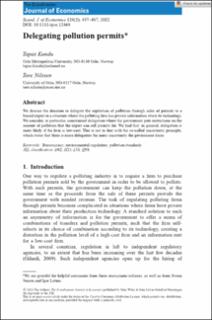| dc.contributor.author | Kundu, Tapas | |
| dc.contributor.author | Nilssen, Tore | |
| dc.date.accessioned | 2022-10-10T07:52:38Z | |
| dc.date.available | 2022-10-10T07:52:38Z | |
| dc.date.created | 2021-12-03T13:05:32Z | |
| dc.date.issued | 2021-12-02 | |
| dc.identifier.issn | 0347-0520 | |
| dc.identifier.issn | 1467-9442 | |
| dc.identifier.uri | https://hdl.handle.net/11250/3024919 | |
| dc.description.abstract | We discuss the decision to delegate the regulation of pollution through sales of permits to a biased expert in a situation where the polluting firm has private information about its technology. We consider, in particular, constrained delegation where the government puts restrictions on the amount of pollution that the expert can sell permits for. We find that, in general, delegation is more likely if the firm is low-cost. This is not in line with the so-called uncertainty principle, which states that there is more delegation the more uncertainty the government faces. | en_US |
| dc.language.iso | eng | en_US |
| dc.publisher | Wiley | en_US |
| dc.relation.ispartofseries | The Scandinavian Journal of Economics;Volume 124, Issue 2 | |
| dc.relation.uri | https://onlinelibrary.wiley.com/doi/10.1111/sjoe.12468 | |
| dc.rights | Navngivelse 4.0 Internasjonal | * |
| dc.rights.uri | http://creativecommons.org/licenses/by/4.0/deed.no | * |
| dc.subject | Bureaucracies | en_US |
| dc.subject | Environmental regulations | en_US |
| dc.subject | Pollution standards | en_US |
| dc.title | Delegating Pollution Permits | en_US |
| dc.type | Peer reviewed | en_US |
| dc.type | Journal article | en_US |
| dc.description.version | publishedVersion | en_US |
| dc.rights.holder | © 2021 The Authors | en_US |
| cristin.ispublished | true | |
| cristin.fulltext | postprint | |
| cristin.qualitycode | 2 | |
| dc.identifier.doi | 10.1111/sjoe.12468 | |
| dc.identifier.cristin | 1964298 | |
| dc.source.journal | The Scandinavian Journal of Economics | en_US |
| dc.source.volume | 124 | en_US |
| dc.source.issue | 2 | en_US |
| dc.source.pagenumber | 457-487 | en_US |

